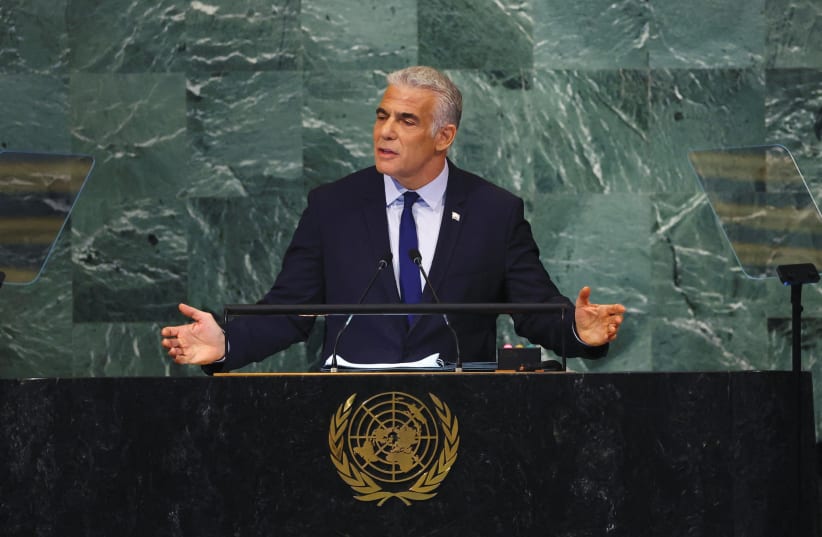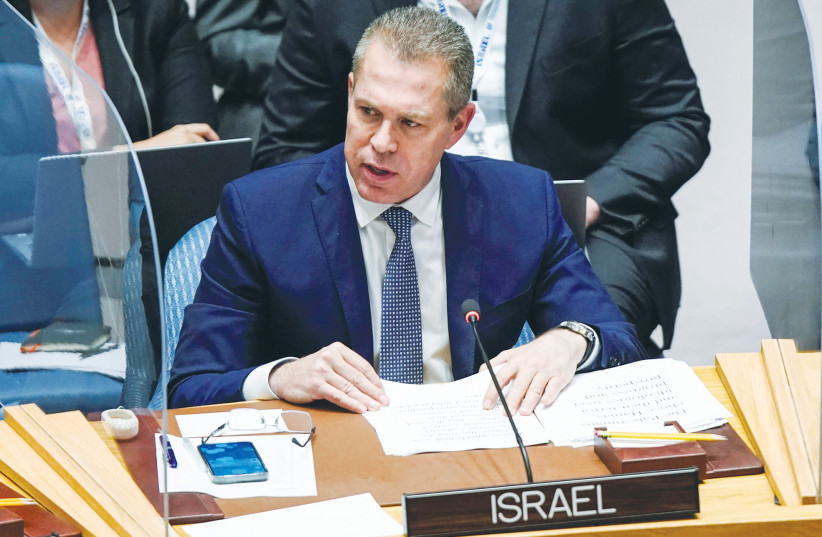Mobbing is a sociological term, first used by Konrad Lorenz in his 1966 book On Aggression, to describe certain behaviors in birds and mammals. Contemporary usage usually relates to human behavior, such as when a group bullies an individual. Mobbing can apply to a variety of contexts, including families, schools and the workplace. An example of workplace mobbing may involve a group of jealous individuals who cannot measure up to a fellow worker’s ability and so try to isolate and ultimately force the individual to leave the company.
To me, Israel’s ordeal at the United Nations is a form of mobbing. Other than the November 29, 1947, UN General Assembly vote to partition Mandatory Palestine into a Jewish state and an Arab state, the UN votes are generally hostile as far as Israel is concerned. The most notorious example was the 1975 resolution, sponsored by the Arab states and Soviet Bloc members, equating Zionism with racism. It was finally revoked in 1991.
The COVID-19 pandemic did not stop the torrent of anti-Israel resolutions by the UN General Assembly (UNGA). In 2021, the international body passed 14 resolutions against Israel. The number for the rest of the world’s 193 UN members was four: resolutions critical of Russia, Iran North Korea and Myanmar (Ariel Kahana, Israel Hayom, 2021).
The statistics for 2020 were similar. The UN condemned Israel 17 times versus six times for the rest of the world (The Times of Israel, 2020). In fact, well over 80% of all UNGA resolutions that criticize a particular country are directed at only one country, Israel (David Sivak, Fact Check, 2017).
Nor is this behavior restricted only to the GA. The prominent Canadian jurist, Irwin Cotler, points out that the voting patterns for smaller UN bodies, such as the UN Human Rights Council, which often includes UN members with terrible human rights records, are just as bad (Irwin Cotler, National Post, 2014).
The votes are based on one-sided resolutions that have no context. Resolutions against the Israeli occupation never mention that Gaza is unoccupied and that its rulers, Hamas, are not interested in an accommodation with Israel. The occasions when negotiations came close to a two-state agreement, only to be rejected by the Palestinians in the end, are not mentioned. The security concerns of Israel, with respect to non-Palestinian actors, such as Hezbollah and Iran, are not mentioned.
THE VOTING patterns are not always consistent. A November 2020 resolution on the right of the Palestinian people to self-determination, and a just peace based on a two-state solution, was adopted with 163 votes for and five against (Israel and the US, the Marshall Islands, Micronesia and Nauru). Ten members abstained (Jacob Magid, The Times of Israel, 2020).
But a recent resolution to refer Israel’s occupation and settlement activity to the International Court of Justice for an advisory opinion passed by a vote of 87 to 26, with 53 abstentions and 27 no-shows (Herb Keinon, The Jerusalem Post, 2023). If the abstentions and no-shows are considered as votes for Israel, the resolution would be defeated 106 to 87.
So why is this happening?
The obvious hypocrisy and cynical manipulation of the UN, as well as the sheer number of resolutions, make it clear that these votes are not merely based on merit. And after all, without knowing the full and tortuous history mentioned earlier, who would not be in favor of Palestinian self-determination and a two-state solution?
The answer lies in the fact that almost 30% of the members of the UN belong to the Organization of Islamic Cooperation (OIC). The OIC was created in 1969 after a fire was started in al-Aqsa Mosque in Jerusalem by a mentally-challenged Australian tourist (Dov Lieber, The Times of Israel, 2017). The mufti of Jerusalem called it a Jewish crime and called for all Muslim heads of state to convene a summit.
The OIC’s 57 members (53 Muslim majority), include 1.95 billion people (almost 25% of the world total), a combined GDP of 22 trillion dollars (NIS 76.6 trillion) and an area covering 31.66 million square kilometers (50% larger than the former Soviet Union). The power of the OIC to control events at the UN to suit an Arab/Islamic agenda is a worrisome development that has affected issues beyond the Israeli-Palestinian conflict (David Littman, Middle East Forum, 1999).
The OIC is the core group largely responsible for marshaling the votes against Israel. That it is such a large group and that no one OIC country wants to be seen as betraying the interests of the whole (a form of peer pressure) guarantees the success of the voting. Even friendly Arab countries, such as Bahrain and the United Arab Emirates, who have signed on to the Abraham Accords, have continued to vote with their OIC cohort. This means that Israel will likely continue to face this form of one-sided criticism and harassment.
One can ask what the mobbing practice against Israel has accomplished. It has diminished the influence and credibility of the UN and it has encouraged Palestinian extremism. It has added to the sense of siege experienced by Israelis and it has reduced Israel’s willingness to make compromises that might affect Israeli security. It has not prevented Israel from continuing to develop and thrive as a democratic society with a strong economy, and as a world leader in new technology.
The writer is a fellow of the Royal Society of Canada and a retired professor at the University of Waterloo.

